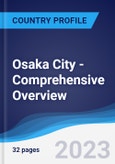The report contains detailed tourism, retail, construction, technology and public infrastructure data and insight into economic, social, and industry trends.
Osaka metropolitan area is Japan’s second most populated area after Tokyo. Osaka boasts a diverse and balanced industrial structure, encompassing key sectors such as chemicals, general machinery, electronics, and metal products. The city's economy, supported by high-tech industries, experienced a growth slowdown to 0.6% in 2022, attributed to disruptions in supply chains and the impact of the Russia-Ukraine war. Despite this, Osaka's nominal GDP reached JPY135.9 trillion ($1.0 trillion) in 2022, contributing 24.4% to the national GDP
Scope
- One of the key economic drivers is tourism sector. Osaka, known as the 'Aqua Metropolis,' stands as a hub for art, culture, and historical sites, with tourism being a vital component of Japan's growth strategy. Osaka Prefecture saw an extraordinary surge in foreign tourist arrivals, reaching 1.8 million, a remarkable increase of over 500% from the previous year
- The construction sector thrived in 2022, contributing 4.3% to the area's GVA, driven by rising demand from urban redevelopment projects and integrated resorts (IRs) related to the upcoming Osaka Expo.
Reasons to Buy
- Gain a comprehensive knowledge of future economic and demographic trends and understand the performance of various sectors within the city.
- Analyze and understand the business environment in the city to align your investment and expansion strategies.
- The report helps to drive a conclusion in choosing a suitable city to invest or expand according to your business structure.
- Explore new opportunities in the hospitality, tourism, construction, real estate and retail sectors.








